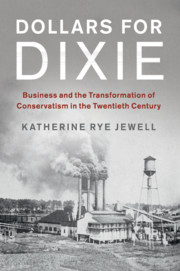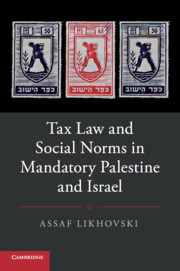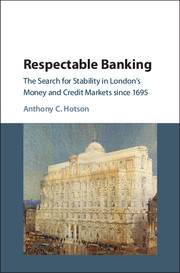Refine search
Actions for selected content:
26946 results in Economic history
Epilogue
-
- Book:
- Tax Law and Social Norms in Mandatory Palestine and Israel
- Published online:
- 05 July 2017
- Print publication:
- 14 July 2017, pp 288-292
-
- Chapter
- Export citation
1 - Before the Income Tax: Jewish, Ottoman, and Early Mandatory Taxation
- from Part I - The Rise of Income Taxation
-
- Book:
- Tax Law and Social Norms in Mandatory Palestine and Israel
- Published online:
- 05 July 2017
- Print publication:
- 14 July 2017, pp 25-60
-
- Chapter
- Export citation
Contents
-
- Book:
- Tax Law and Social Norms in Mandatory Palestine and Israel
- Published online:
- 05 July 2017
- Print publication:
- 14 July 2017, pp vii-viii
-
- Chapter
- Export citation
Part II - The Ascendancy of Social Norms
-
- Book:
- Tax Law and Social Norms in Mandatory Palestine and Israel
- Published online:
- 05 July 2017
- Print publication:
- 14 July 2017, pp 99-200
-
- Chapter
- Export citation
Bibliography
-
- Book:
- Tax Law and Social Norms in Mandatory Palestine and Israel
- Published online:
- 05 July 2017
- Print publication:
- 14 July 2017, pp 293-326
-
- Chapter
- Export citation
Part I - The Rise of Income Taxation
-
- Book:
- Tax Law and Social Norms in Mandatory Palestine and Israel
- Published online:
- 05 July 2017
- Print publication:
- 14 July 2017, pp 23-98
-
- Chapter
- Export citation
Introduction: The Intimate Fiscal State
-
- Book:
- Tax Law and Social Norms in Mandatory Palestine and Israel
- Published online:
- 05 July 2017
- Print publication:
- 14 July 2017, pp 1-22
-
- Chapter
- Export citation
2 - The Introduction of Income Taxation in Mandatory Palestine
- from Part I - The Rise of Income Taxation
-
- Book:
- Tax Law and Social Norms in Mandatory Palestine and Israel
- Published online:
- 05 July 2017
- Print publication:
- 14 July 2017, pp 61-98
-
- Chapter
- Export citation
3 - Taxation without Law: The Jewish Voluntary Tax System
- from Part II - The Ascendancy of Social Norms
-
- Book:
- Tax Law and Social Norms in Mandatory Palestine and Israel
- Published online:
- 05 July 2017
- Print publication:
- 14 July 2017, pp 101-148
-
- Chapter
- Export citation
5 - The Rise of Tax Experts: Accountants, Lawyers, and Economists
- from Part III - The Transformation of Israeli Taxation and Its Law
-
- Book:
- Tax Law and Social Norms in Mandatory Palestine and Israel
- Published online:
- 05 July 2017
- Print publication:
- 14 July 2017, pp 203-246
-
- Chapter
- Export citation
Part III - The Transformation of Israeli Taxation and Its Law
-
- Book:
- Tax Law and Social Norms in Mandatory Palestine and Israel
- Published online:
- 05 July 2017
- Print publication:
- 14 July 2017, pp 201-287
-
- Chapter
- Export citation
Note on Transliteration
-
- Book:
- Tax Law and Social Norms in Mandatory Palestine and Israel
- Published online:
- 05 July 2017
- Print publication:
- 14 July 2017, pp xvi-xvi
-
- Chapter
- Export citation
Copyright page
-
- Book:
- Tax Law and Social Norms in Mandatory Palestine and Israel
- Published online:
- 05 July 2017
- Print publication:
- 14 July 2017, pp iv-iv
-
- Chapter
- Export citation
Figures
-
- Book:
- Tax Law and Social Norms in Mandatory Palestine and Israel
- Published online:
- 05 July 2017
- Print publication:
- 14 July 2017, pp ix-x
-
- Chapter
- Export citation
6 - The Transformation of Tax Law: Doctrinal and Legislative Reforms
- from Part III - The Transformation of Israeli Taxation and Its Law
-
- Book:
- Tax Law and Social Norms in Mandatory Palestine and Israel
- Published online:
- 05 July 2017
- Print publication:
- 14 July 2017, pp 247-287
-
- Chapter
- Export citation

Dollars for Dixie
- Business and the Transformation of Conservatism in the Twentieth Century
-
- Published online:
- 13 July 2017
- Print publication:
- 24 April 2017

Worker Voice
- Employee Representation in the Workplace in Australia, Canada, Germany, the UK and the US 1914–1939
-
- Published by:
- Liverpool University Press
- Published online:
- 12 July 2017
- Print publication:
- 31 December 2016
-
- Book
- Export citation

Tax Law and Social Norms in Mandatory Palestine and Israel
-
- Published online:
- 05 July 2017
- Print publication:
- 14 July 2017

Respectable Banking
- The Search for Stability in London's Money and Credit Markets since 1695
-
- Published online:
- 04 July 2017
- Print publication:
- 15 June 2017
Selling Power: Economics, Policy, and Electric Utilities Before 1940. By John L. Neufeld . Chicago: University of Chicago Press, 2016. xiv + 327 pp. Photographs, figures, tables, bibliography, notes, index. Cloth, $60.00. ISBN: 978-0-226-39963-8.
-
- Journal:
- Business History Review / Volume 91 / Issue 2 / Summer 2017
- Published online by Cambridge University Press:
- 02 August 2017, pp. 420-422
- Print publication:
- Summer 2017
-
- Article
- Export citation
